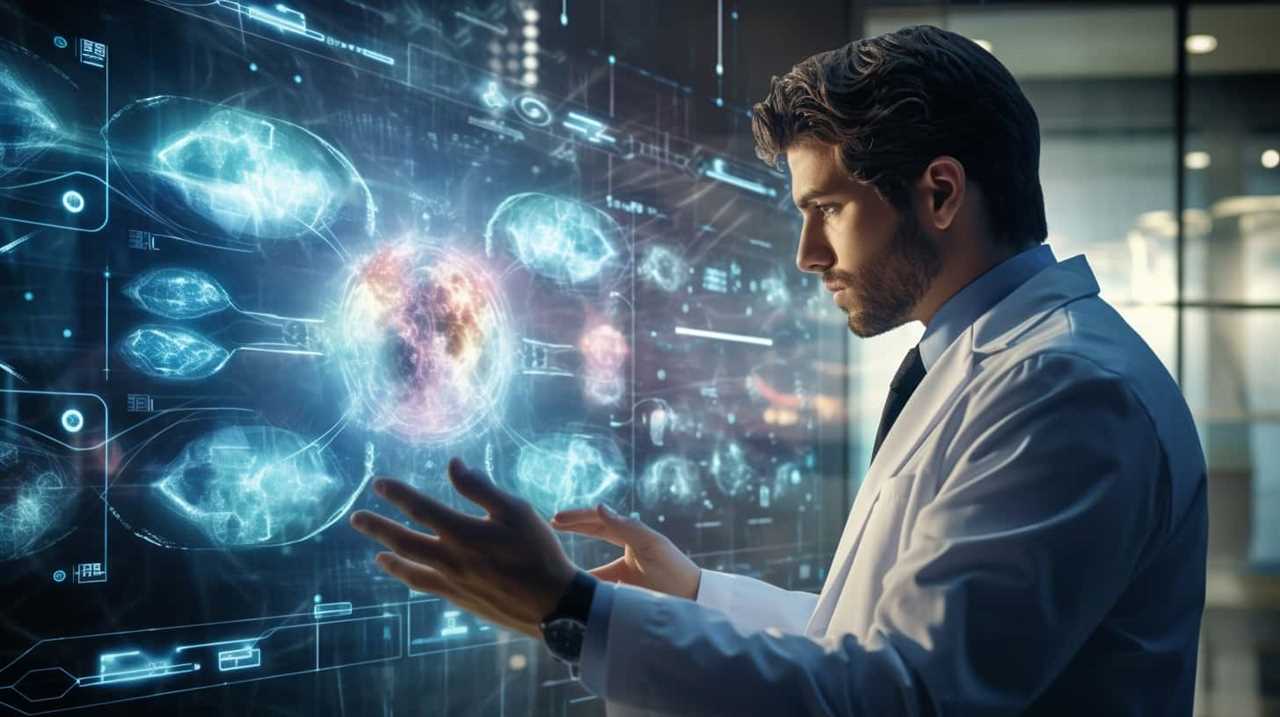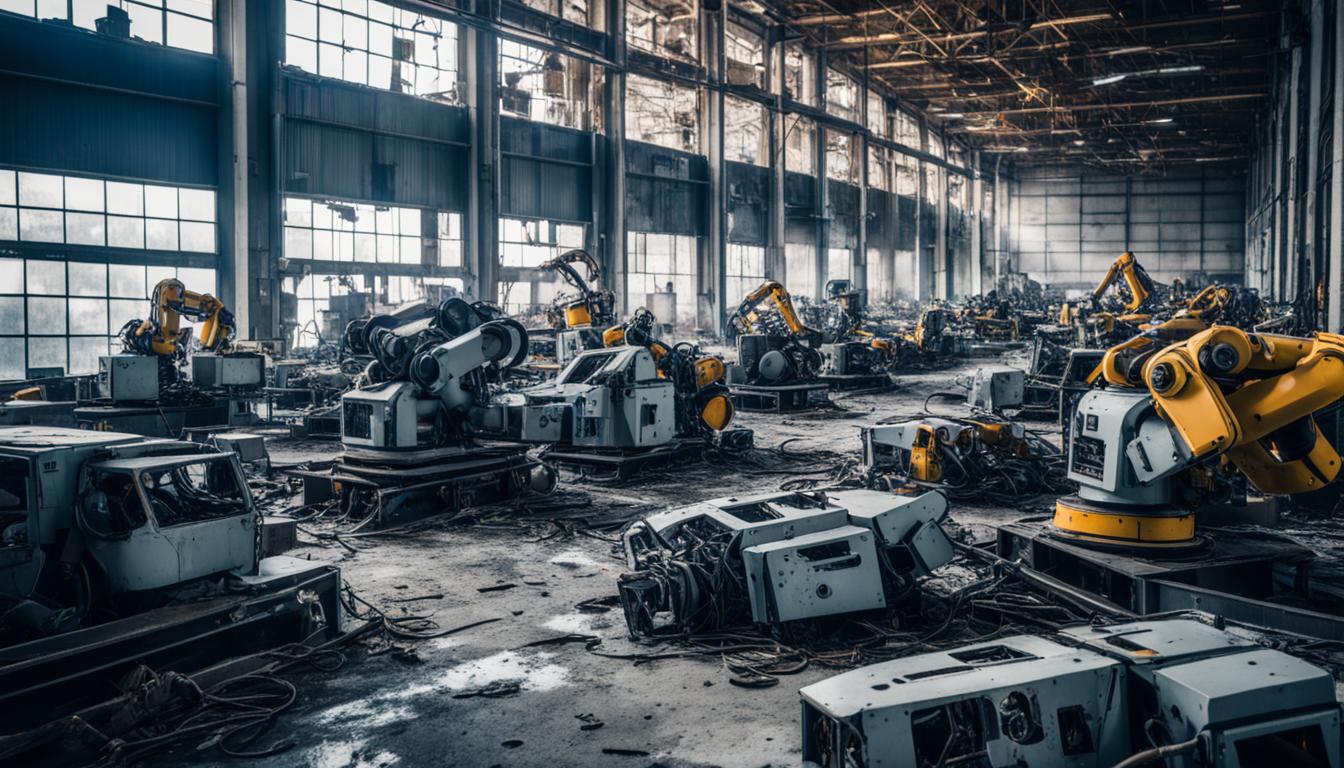The fast-paced development of artificial intelligence (AI) is transforming various sectors, highlighting the importance of comprehending its significant influence on employment. AI has the capability to generate fresh job prospects and enhance efficiency, yet it also raises worries about potential job displacement and alterations in the labor market.
In this article, we will explore the implications of AI on jobs, the future of work with AI, and the measures needed to adapt and thrive in this evolving landscape. From AI job automation to the impact of automation on the workforce, we will delve into the various aspects that shape the relationship between AI and employment. Let’s navigate through the trends and insights that will define the employment landscape in the age of AI.
Key Takeaways:
- AI has the potential to create new job opportunities while disrupting traditional employment patterns.
- Concerns about job displacement and the ethical use of AI in the workplace have sparked intense debates.
- Guidelines and regulations must be established to harness the potential of AI for the greater good.
- Upskilling and reskilling programs are crucial to mitigate the effects of automation and equip workers with the skills needed in an evolving economy.
- The future of work will be shaped by automation, the gig economy, remote work, and AI-driven hiring processes.
Introduction to AI and its Role in the Job Market
Artificial Intelligence (AI) is transforming our world in unprecedented ways. From automating routine tasks to enabling breakthrough innovations, AI has become an integral part of our lives and work. In this section, we will explore the introduction to AI, its applications in various industries, and its role in shaping the job market.
AI refers to the development of intelligent software systems that mimic human intelligence. It can analyze vast amounts of data, recognize patterns, and make informed decisions. AI has the potential to revolutionize the job market, creating new opportunities and transforming existing roles.
One of the key applications of AI is automation. AI-powered automation can streamline processes, increase efficiency, and reduce costs. From chatbots handling customer inquiries to autonomous vehicles transforming transportation, AI is paving the way for a more automated future.
Moreover, AI is not just about replacing jobs. It also has the potential to create new job opportunities. As AI continues to advance, new roles requiring expertise in AI technology are emerging. For example, data analysts, machine learning engineers, and AI ethicists are in high demand. These roles require a combination of technical skills and ethical considerations to navigate the responsible use of AI.
The potential of AI in the job market is vast and varied. It can automate mundane tasks, drive innovation, and create new opportunities. However, concerns regarding AI ethics and responsible AI use are crucial. We must address these concerns to ensure the ethical adoption and implementation of AI in the workplace.
AI applications span across industries, revolutionizing sectors such as healthcare, finance, education, and more. In healthcare, AI can assist doctors with accurate diagnosis and treatment recommendations. In finance, AI algorithms can analyze market data to make informed investment decisions. In education, AI-powered platforms can provide personalized learning experiences for students.
As we embrace the potential of AI, it is essential to prioritize responsible and ethical AI use. Measures must be in place to ensure transparency, fairness, and accountability. Guidelines and regulations can help establish a framework for responsible AI adoption, protecting individuals and organizations from unethical practices.
In the next section, we will explore the scope and importance of AI, including its impact on economic growth, productivity, and competitiveness. We will delve deeper into the challenges and opportunities that arise with the adoption of AI in the job market.
Scope and Importance of Artificial Intelligence
The adoption of Artificial Intelligence (AI) in the job market is revolutionizing industries and transforming the way we work. AI’s impact reaches far beyond automation and has significant implications for economic growth, productivity, job displacement, and competitiveness.
One of the key advantages of AI is its ability to automate repetitive and time-consuming tasks, allowing businesses to improve efficiency and reduce costs. By freeing up human labor, AI enables employees to focus on higher-level tasks that require problem-solving and creativity.
Additionally, AI enhances decision-making processes by analyzing vast amounts of data and providing valuable insights. This helps businesses make more informed decisions, leading to improved productivity and competitive advantage.
While AI presents immense opportunities, its adoption also entails challenges. Job displacement is a concern as some roles become automated, potentially leading to unemployment for certain sectors of the workforce. It is vital for policymakers, businesses, and workers to collaborate and develop strategies to manage these transitions effectively.
To harness the benefits of AI, industries must adapt and integrate AI technologies into their operations. This includes identifying areas where AI can create value, fostering a culture of innovation, and ensuring the necessary infrastructure and skills are in place for successful implementation.
Industries Benefiting from AI Integration
| Industry | Impact of AI |
|---|---|
| Manufacturing | – Increased automation and efficiency in production processes – Improved quality control and predictive maintenance |
| Finance | – Enhanced fraud detection and risk assessment – Personalized financial recommendations and customer service |
| Healthcare | – Accurate diagnosis and treatment planning – Streamlined administrative tasks, reducing paperwork |
| Retail | – Optimized inventory management and demand forecasting – Enhanced customer experiences through personalized recommendations |
| Transportation | – Autonomous vehicles and optimized route planning – Improved logistics and supply chain management |
By leveraging AI’s potential, businesses can gain a competitive edge in these industries and drive economic growth. However, it is crucial to address the potential challenges posed by job displacement and ensure a smooth transition for affected workers. Upskilling and reskilling programs can play a critical role in equipping individuals with the necessary skills to thrive in an AI-driven job market.
Overall, the scope and importance of AI extend beyond individual industries. AI has the potential to transform economies by boosting productivity, stimulating innovation, and enhancing global competitiveness. Embracing AI technologies responsibly and collaboratively is essential for realizing the full benefits of AI and building a future where human potential and AI capabilities work together harmoniously.
Automation and Job Displacement
Automation has had a significant impact on the job market, with both positive and negative implications. On the one hand, automation can lead to increased productivity and efficiency, resulting in lower costs and higher profits for businesses. On the other hand, it can also lead to job losses and wage decreases for workers.
Low-skilled jobs are particularly at risk of automation. Tasks that are repetitive and predictable, such as assembly line work or data entry, can be easily automated using AI and robotics technologies. This can result in job displacement for workers in these industries.
However, it’s important to note that automation also creates new job opportunities. As certain tasks become automated, new roles that require problem-solving, critical thinking, and technical skills emerge. These jobs are often higher-paying and offer more room for career growth.
To mitigate the effects of automation and ensure a smooth transition, upskilling and reskilling programs are crucial. This involves equipping workers with the necessary skills to adapt to an evolving job market. By investing in education and training, workers can acquire the skills needed for the jobs of the future.
“The key to thriving in an automated world is to continuously learn and update our skills to remain employable.”
Investing in education and training is not only beneficial for individual workers but also for the overall economy. By nurturing a highly skilled workforce, we can stimulate innovation, productivity, and economic growth.
| Impact of Automation | Job Losses | Job Opportunities with Automation | Upskilling and Reskilling | Investment in Education and Training |
|---|---|---|---|---|
| Increased productivity and efficiency | Job displacement in low-skilled jobs | New roles requiring problem-solving skills | Upskilling programs for transitioning workers | Enhanced skills for an evolving job market |
| Potential for lower costs and higher profits | Wage decreases for displaced workers | Career growth opportunities | Reskilling initiatives for new job roles | Stimulated innovation and productivity |
By understanding the impact of automation and strategically investing in education and training, businesses and workers can navigate the changing job landscape and seize the opportunities presented by automation.
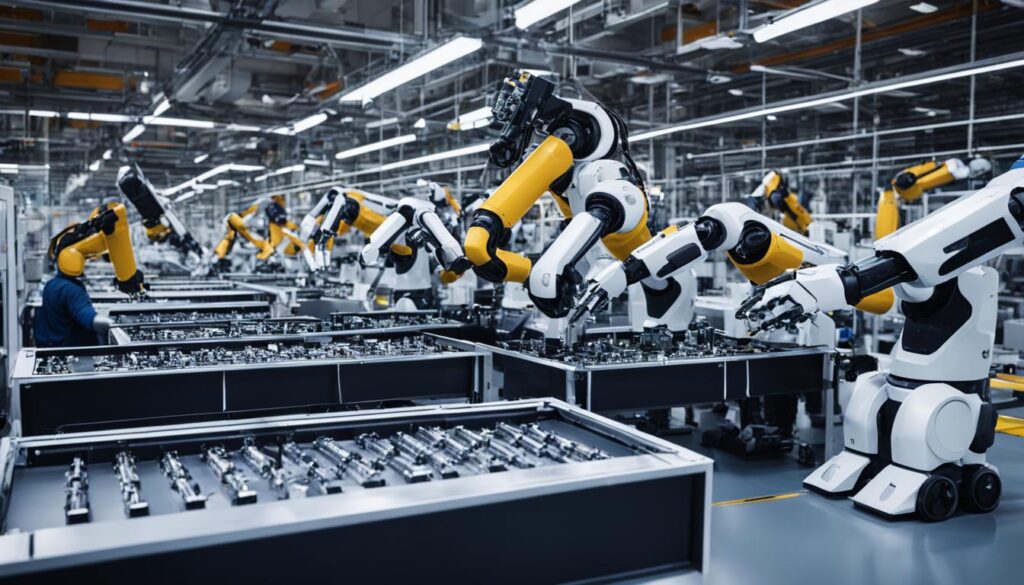
Industries Most at Risk of Automation
In today’s rapidly evolving landscape, the integration of AI and automation technologies has the potential to significantly impact various industries. While automation presents opportunities for increased efficiency and productivity, it also poses challenges and risks for certain sectors.
Industries involving repetitive and predictable work, such as manufacturing, transportation, and customer service, are particularly vulnerable to automation. In these sectors, machines can perform tasks more quickly and accurately, leading to potential job displacements. A study by McKinsey Global Institute suggests that up to 73 million jobs in the United States could be automated by 2030.
However, it’s important to note that AI technologies are not limited to automating routine tasks. They are also being embraced in industries like finance, healthcare, and education, where they have the potential to enhance decision-making processes and deliver personalized customer experiences.
In the finance industry, for example, AI-powered algorithms can analyze vast amounts of data, enabling more accurate risk assessments and investment decisions. In healthcare, AI applications aid in diagnosing diseases and developing treatment plans tailored to individual patients. In education, AI-based tools and platforms provide personalized learning experiences and support students’ skill development.
While automation may reshape the workforce, it also creates new job opportunities that require specialized skills. To remain competitive in these evolving industries, workers need to continuously develop their skills and invest in their professional growth. Companies, on the other hand, must prioritize investment in employee training and development to ensure a smooth transition to an automated environment.
Investment in Employee Training and Development
The integration of AI and automation technologies calls for a reevaluation of workforce skills. To thrive in this changing landscape, employees need to acquire new competencies that complement AI technologies. Upskilling and reskilling initiatives play a crucial role in equipping workers with the necessary skills to adapt to automation.
Investing in training programs that focus on AI technologies and related skills can help employees navigate the changing job market. These programs can include technical training in areas such as data analysis, machine learning, and programming, as well as the cultivation of interpersonal and problem-solving skills.
Furthermore, continuous skills development encourages a culture of learning within organizations, fostering innovation and growth. Upskilling and reskilling initiatives not only benefit individuals but also contribute to the overall competitiveness and long-term success of businesses.
Effective workforce development strategies involve collaboration between educational institutions, businesses, and government entities. This partnership ensures that training programs align with industry needs and provide individuals with the skills required for emerging job opportunities.
Skills Development for a Resilient Workforce
The advancement of automation technologies necessitates a shift towards developing skills that are less susceptible to automation. While AI can excel in tasks requiring data analysis and pattern recognition, human skills such as creativity, emotional intelligence, and critical thinking remain valuable and in high demand.
With the automation of routine and repetitive tasks, workers can focus on higher-value work that involves complex problem-solving and decision-making. This transition highlights the importance of nurturing skills that complement AI technologies, enabling individuals to leverage their unique human capabilities.
“Embracing AI and automation in the workplace requires a comprehensive approach that includes skills development and investment in employee training. By cultivating a resilient workforce, we can navigate the changing landscape and harness the full potential of these technologies.”
– Jane Johnson, HR Manager at InnovateTech
As industries continue to integrate AI and automation technologies, the future of work will revolve around a collaboration between humans and machines. While some job roles may undergo transformation or displacement, the adoption of AI also holds the promise of unlocking new possibilities and opportunities for industries.
| Manufacturing Automation | Transportation Automation | Customer Service Automation | AI in Finance | AI in Healthcare | AI in Education |
|---|---|---|---|---|---|
| Predictable assembly line tasks | Autonomous vehicles | Chatbots and virtual assistants | Automated risk assessments and investment decisions | Medical diagnosis and personalized treatment plans | Personalized learning experiences and skill development |
| Machine operators | Delivery services | Order tracking and support | Data analysis and fraud detection | Administrative tasks and patient monitoring | Educational platforms and AI tutors |
| Quality control inspections | Supply chain management | Automated ticketing and self-service kiosks | Algorithmic trading and portfolio management | Drug discovery and treatment research | Adaptive assessments and virtual classrooms |

The Rise of AI-based Technologies and Their Impact on Job Creation
AI-based technologies have the potential to revolutionize the job market, driving innovation and growth in various industries. The impact of AI on job creation is significant, presenting exciting opportunities for individuals and businesses alike. Let’s explore how AI is transforming specific sectors:
AI in Healthcare
The application of AI in healthcare is transforming the industry, improving patient care and outcomes. AI-powered technologies can assist doctors in diagnosing diseases, identifying treatment options, and streamlining administrative tasks. By leveraging AI’s analytical capabilities, healthcare professionals can make data-driven decisions and provide personalized care to patients.
AI in Finance
AI is reshaping the finance industry by automating processes and enhancing decision-making. With AI-driven algorithms, financial institutions can analyze vast amounts of data, detect patterns, and make accurate predictions. This enables better risk management, investment strategies, and fraud detection. AI-based financial technologies are creating opportunities for data analysts, AI strategists, and machine learning engineers.
AI in Education
Education is leveraging AI to enhance learning experiences and improve outcomes. Intelligent tutoring systems and adaptive learning platforms adapt to individual student needs, offering personalized education. AI-powered tools can automate administrative tasks, allowing educators to focus on delivering quality instruction. The role of AI in education creates opportunities for e-learning specialists, educational data analysts, and instructional designers.
These are just a few examples of how AI-based technologies are reshaping various industries. AI’s impact on job creation is not limited to these sectors alone. The rapid advancement of AI creates a demand for interdisciplinary skills, blending technical expertise with soft skills such as critical thinking, creativity, and emotional intelligence.
The rise of AI-based technologies presents us with an exciting future, where machines and humans work collaboratively to drive innovation and improve productivity. Businesses must adapt to leverage these technologies, while individuals need to develop the necessary skills to excel in AI-related job roles. By embracing AI’s potential and nurturing interdisciplinary skills, we can thrive in an ever-evolving job market.
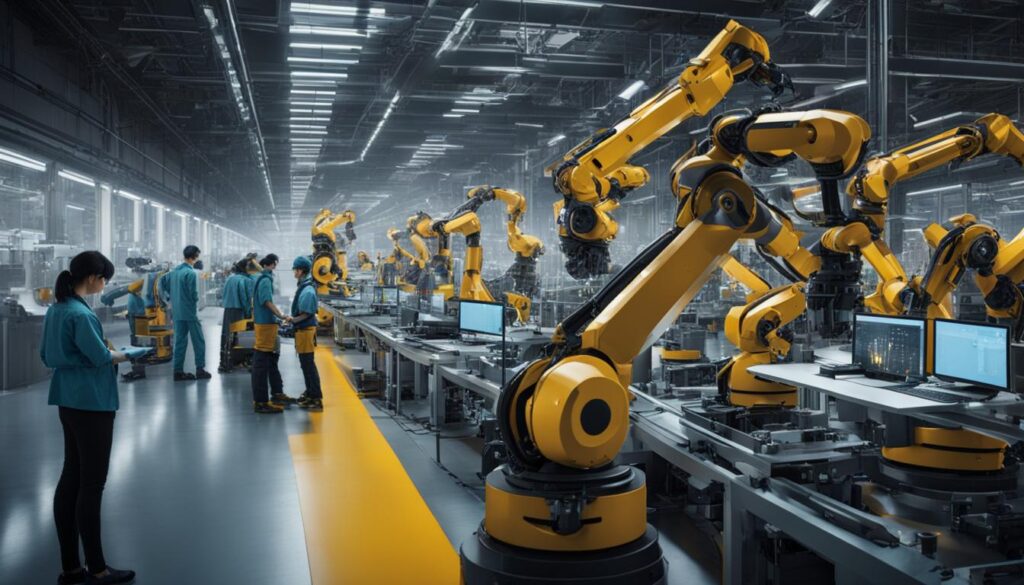
Impact of AI on High-Skilled Jobs
AI has the potential to revolutionize the job market by automating mundane tasks and augmenting high-skilled jobs. With AI, we can leverage the strengths of both humans and machines, leading to greater efficiency and productivity in the workforce. By incorporating AI technologies, we can transform the way we work and open up new job opportunities.
One of the key benefits of AI is its ability to mitigate human biases and enhance decision-making through data-driven insights. By analyzing vast amounts of data, AI algorithms can provide valuable recommendations and predictions, enabling professionals in high-skilled jobs to make more informed choices. This not only improves the accuracy and efficiency of their work but also frees up their time to focus on more strategic and creative tasks.
“AI has the potential to transform high-skilled jobs by automating repetitive tasks and enabling professionals to focus on more strategic and creative aspects of their work.”
However, the impact of AI on high-skilled jobs goes beyond automation. It also entails the transformation of job roles and the emergence of new opportunities. As AI evolves, some job functions may become obsolete or undergo significant changes, requiring professionals to adapt their skill sets accordingly. This transformation may involve upskilling and reskilling to master new technologies and acquire the interdisciplinary skills necessary to thrive in the AI-driven job market.
Despite the potential concerns surrounding job displacement, AI opens doors to a wide range of new job opportunities. It creates demand for specialized roles such as AI data analysts, machine learning engineers, and AI ethicists. These positions require a combination of technical expertise and critical thinking skills, bridging the gap between human capabilities and AI capabilities.
Overall, AI’s potential to transform the job market is substantial. It is not only about automation but also about leveraging the unique strengths of humans and machines to create a more efficient and dynamic workforce. By embracing AI and recognizing its potential, we can navigate the changing job landscape, adapt to new roles, and harness the benefits of AI in high-skilled jobs.
Impact of AI on High-Skilled Jobs
| Impact | Description |
|---|---|
| Automation | AI can automate repetitive tasks, freeing up time for professionals to focus on more strategic and creative aspects of their work. |
| Job Transformation | Some high-skilled job roles may undergo significant changes due to AI, requiring professionals to adapt their skill sets accordingly. |
| New Job Opportunities | AI creates demand for specialized roles that require a combination of technical expertise and critical thinking skills. |
| Leveraging Human and Machine Strengths | By embracing AI, we can leverage the unique strengths of humans and machines to create a more efficient and dynamic workforce. |

Upskilling and Reskilling for the AI-driven Job Market
In today’s rapidly evolving job market, upskilling and reskilling have become essential for workers to remain competitive and relevant. The rise of AI has created a demand for specific AI-related skills, making it crucial for individuals to acquire the necessary knowledge and expertise to thrive in an AI-driven economy.
Organizations understand the importance of AI skills and have responded by offering comprehensive training programs and certifications. These programs cover a range of topics, including data analysis, machine learning, and AI ethics. By investing in AI-related training, individuals can enhance their technical abilities and position themselves for success in AI-driven industries.
In addition to technical skills, soft skills play a vital role in the AI-driven job market. Effective communication, problem-solving, and critical thinking are highly valued qualities that enable workers to collaborate effectively and overcome challenges in AI-centric roles. It is important for individuals to develop and showcase these soft skills alongside their technical competencies.
“Soft skills such as communication and problem-solving are increasingly important in the AI-driven job market. These skills enable workers to effectively collaborate and adapt to new challenges, making them valuable assets in AI-centric roles.”
For those looking to pursue a career in AI, various educational pathways are available. AI training programs offered by universities and online platforms provide in-depth knowledge and practical experience, equipping individuals with the necessary skills to excel in AI-related roles. Additionally, AI degrees and certifications from reputable institutions offer a formal qualification that demonstrates expertise in the field.
To illustrate the value of upskilling and reskilling in the AI-driven job market, here is a table outlining some of the most sought-after AI skills and the corresponding training programs:
| AI skill | Training program |
|---|---|
| Data analysis | Coursera – Data Science and Machine Learning Bootcamp |
| Machine learning | edX – Machine Learning Fundamentals |
| Natural language processing | Udacity – Natural Language Processing Nanodegree |
| AI ethics | MIT – Ethics of Artificial Intelligence |
By honing their AI-related skills and maintaining a commitment to lifelong learning, individuals can adapt to the changing job market and unlock new career opportunities. With the right combination of technical and soft skills, they can make significant contributions to the AI-driven economy.
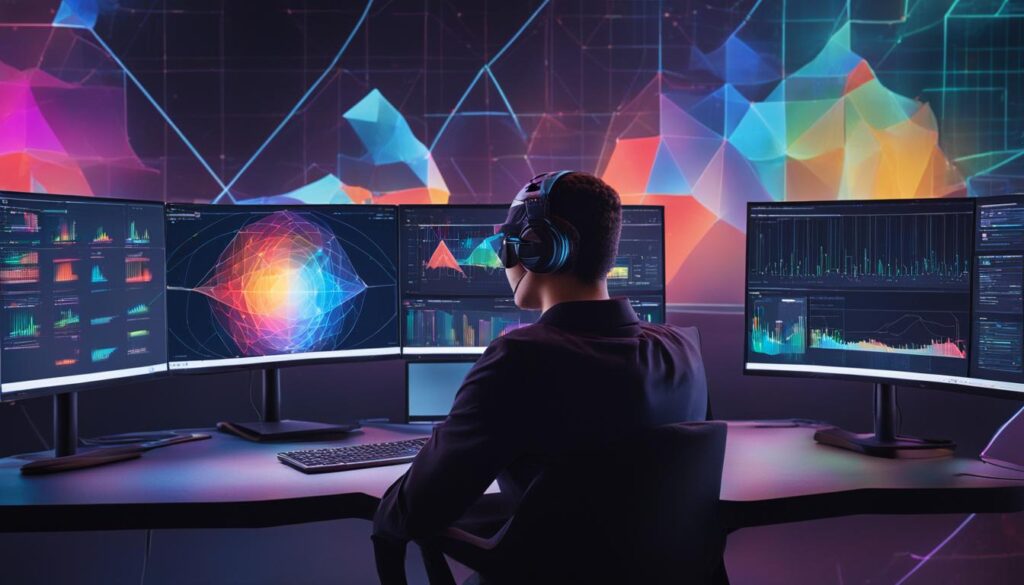
Importance of Soft Skills in the AI-driven Job Market
While technical skills are essential in the AI-driven job market, soft skills like communication, empathy, creativity, and innovative thinking are equally crucial. In fact, these soft skills become even more valuable with the integration of AI technology.
Effective communication is essential for interacting with colleagues, clients, and customers. As AI becomes more integrated into workplaces, the ability to effectively convey ideas and collaborate with both humans and AI systems will be vital for success.
“Good communication is the bridge between confusion and clarity.”
Empathy is another key soft skill that plays a significant role in the AI-driven job market. While AI can perform many tasks efficiently, it lacks the ability to understand human emotions. Empathy enables workers to understand and relate to clients and customers, providing better customer experiences and building stronger relationships.
Creativity and innovative thinking are highly valuable in an AI-driven job market. AI systems excel at data processing and automation but may struggle with generating unique and original ideas. Human creativity, on the other hand, fosters innovation and drives the development of new solutions and strategies.
Table: Comparison of AI skills and soft skills in the job market
| AI Skills | Soft Skills |
|---|---|
| Data analysis | Communication |
| Automation | Empathy |
| Pattern recognition | Creativity |
| Algorithm optimization | Innovative thinking |
The integration of AI in the workforce requires individuals to possess a combination of technical skills and soft skills. While AI systems excel at technical tasks, it is the unique human qualities that can truly complement and enhance the capabilities of AI.
As AI continues to advance and reshape the job market, individuals who develop and showcase strong soft skills alongside technical expertise will be well-positioned for success.
The Future of Work and AI Relationship
The future of work is evolving rapidly, driven by advancements in technology and the increasing impact of artificial intelligence (AI). As we embrace the potential of automation, the gig economy, remote work, AI-driven hiring, creative AI, and other future work trends, we are entering a new era where the relationship between humans and AI will shape the way we work and live.
Automation: Transforming Traditional Jobs
Automation has the potential to revolutionize the job market by replacing traditional jobs with AI-powered systems and machines. While this may lead to concerns about job displacement, it also presents an opportunity for workers to focus on more complex and innovative tasks that require human skills and creativity.
The Gig Economy: Flexibility and Autonomy
The rise of the gig economy allows individuals to work on a flexible schedule and choose projects that align with their interests and skills. AI-driven platforms and marketplaces facilitate the connection between gig workers and clients, offering opportunities for remote work and diverse income streams. The gig economy enables individuals to have greater control over their careers and work-life balance.
Remote Work: Collaboration from Anywhere
Advancements in technology have made remote work increasingly accessible and efficient. With the ability to collaborate seamlessly from anywhere, remote work offers flexibility and cost savings for both individuals and organizations. AI-powered tools and platforms enable virtual communication, project management, and data sharing, creating a connected and productive remote work environment.
AI-Driven Hiring: Optimizing Recruitment Processes
AI has transformed the hiring process by automating candidate screening, matching, and evaluation. AI-driven hiring platforms analyze resumes, assess skills, and conduct interviews, saving time and resources for recruiters. These systems utilize algorithms and machine learning to identify the best candidates, improving the efficiency and accuracy of the recruitment process.
Creative AI: Unlocking New Possibilities
Creative AI technologies, such as machine learning and natural language processing, are enabling machines to generate original content, design, and innovate. These advancements are opening up new possibilities across various industries, from generating personalized marketing campaigns to creating unique artworks. Creative AI augments human creativity and expands the boundaries of what is possible.
By embracing the future work trends powered by automation, the gig economy, remote work, AI-driven hiring, and creative AI, individuals and organizations can position themselves for success in the changing landscape. As we navigate this evolving relationship between humans and AI, it is essential to adapt, upskill, and embrace the opportunities presented by these emerging trends.
Analyzing AI’s Role in Work’s Future
In this section, we will delve into the economic impact of AI and its potential for driving growth and productivity enhancements in various workforces. The transformative nature of AI will have far-reaching implications on labor market outcomes and the overall economy. Let’s explore in detail how AI is shaping the future of work.
Economic Impact of AI
AI has the potential to generate significant economic growth by revolutionizing industries and driving innovation. The adoption of AI technologies could result in additional global economic activity amounting to X trillion by 2030, contributing to higher cumulative GDP. As AI continues to evolve and advance, its economic impact is expected to be profound.
AI’s Impact on Workforces
As AI becomes more prevalent, its impact on workforces becomes undeniable. The widespread adoption of AI is projected to vary among companies, with approximately 70% embracing AI by 2030. This adoption will lead to the transformation of job roles and skills required in various industries. The implications of AI on workforces will be vast and diverse.
Labor Market Outcomes
The introduction of AI into the labor market will bring about changes in employment patterns, job creation, and job displacement. While some jobs may become obsolete due to automation, new opportunities will emerge. The labor market outcomes will vary across sectors and geographic regions, necessitating proactive adaptation and upskilling.
| AI’s Potential for Economic Growth | AI’s Impact on Productivity |
|---|---|
| AI has the potential to drive economic growth by increasing efficiency, improving decision-making, and fostering innovation. | AI can enhance productivity by automating repetitive tasks, enabling workers to focus on higher-value activities. |
| AI-powered technologies can unlock new business opportunities, improve processes, and create new products and services. | By leveraging AI’s capabilities, organizations can achieve higher productivity levels, leading to economic growth. |
While the full extent of AI’s impact on workforces, labor market outcomes, and economic growth is yet to be realized, it is clear that AI has the potential to reshape the future of work. Embracing AI’s potential while addressing the challenges it presents will be crucial in harnessing its benefits and ensuring a prosperous future for all.
How Artificial Intelligence Will Change the World
Artificial Intelligence (AI) has the potential to bring about numerous positive changes to society. From enhancing productivity to improving healthcare outcomes, AI-powered technologies are transforming various aspects of our lives. Let’s explore some of the key areas where AI is making a significant impact.
Productivity Enhancements
AI is revolutionizing productivity by automating tasks and streamlining workflows. With AI-powered systems handling mundane and repetitive tasks, workers can focus on high-value activities that require critical thinking and creativity. AI algorithms can analyze vast amounts of data in a fraction of the time, enabling businesses to make informed decisions more efficiently.
Healthcare Improvements
AI is transforming the healthcare industry by assisting doctors in diagnosing diseases, monitoring patients, and recommending treatment plans. Machine learning algorithms can analyze medical images with a high degree of accuracy, aiding in early detection and diagnosis. Virtual assistants powered by AI can also provide personalized healthcare recommendations, improving patient outcomes and reducing the burden on healthcare professionals.
Increased Access to Education
AI is helping to bridge educational gaps and increase access to quality education. Intelligent tutoring systems can personalize learning experiences and provide targeted interventions based on students’ individual needs. AI-powered platforms can also analyze large amounts of educational data to identify trends and patterns, helping educators make data-driven decisions to improve instruction.
AI’s Role in Solving Complex Problems
AI’s ability to process and analyze vast amounts of data makes it an invaluable tool in solving complex problems. From climate change to disease control, AI algorithms can identify patterns and correlations that humans may not be able to detect. By leveraging AI, researchers and scientists can accelerate the pace of discoveries and develop innovative solutions to global challenges.
“AI’s potential to solve complex problems and improve society is immense. It empowers us to tackle some of the biggest challenges we face today.”
AI also has a positive impact on society as a whole. By revolutionizing industries and creating new job opportunities, AI contributes to economic growth and prosperity. It enables businesses to operate more efficiently and deliver better products and services to consumers. AI-powered technologies simplify our daily lives, from voice assistants that help manage our schedules to smart home devices that automate household tasks.
As AI continues to advance, the possibilities are endless. From self-driving cars to personalized medicine, AI has the potential to transform the world in ways we haven’t even imagined. By harnessing the power of AI responsibly and ethically, we can shape a future that benefits all of humanity.
How Will AI Affect Jobs and the Economy?
AI’s impact on jobs and the economy is significant and multifaceted. On one hand, AI has the potential to replace a significant number of jobs through automation. This disruption can be unsettling, as workers worry about job security and the impact on their livelihoods. On the other hand, AI also creates new job opportunities and drives increased productivity and innovation.
The adoption of AI is on the rise, with an estimated 70% of companies embracing AI by 2030. This widespread adoption will have transformative effects on the economy, leading to additional economic activity and increased GDP growth. The disruptive potential of AI cannot be underestimated, as it reshapes industries and demands new skills and capabilities from the workforce.
Businesses that effectively leverage AI will be able to increase efficiency and competitiveness, while workers with AI-related skills will find new job prospects. This increased innovation with AI opens doors to exciting possibilities, from personalized customer experiences to breakthroughs in healthcare and beyond.
However, it is crucial to approach AI adoption with caution and responsibility. As AI becomes more pervasive in the job market, it is essential to ensure that the benefits are shared equitably and that the potential negative impacts, such as job displacement, are managed proactively. Balancing the disruptive potential of AI with the need for ethical and responsible use is key to creating a future where AI and human workers can thrive together.
So, while AI’s impact on jobs and the economy is complex, it presents an opportunity for us to reimagine work, drive innovation, and create a better future.
What Jobs Are Most Likely to Be Automated?
Certain jobs are more likely to be automated as the adoption of artificial intelligence (AI) and automation technologies continues to expand. Let’s take a closer look at some of the job roles that are prone to automation:
- Customer Service Representatives: AI-powered chatbots and virtual assistants are being increasingly used to handle customer queries and support, reducing the need for human interaction.
- Receptionists: Automated systems are being implemented to handle routine tasks such as appointment scheduling and visitor management, minimizing the need for human receptionists.
- Accountants/Bookkeepers: AI algorithms can automate complex accounting tasks, data entry, and financial analysis, streamlining processes and reducing the reliance on manual work.
- Salespeople: With the rise of e-commerce and web and social media advertising, sales roles are being impacted by automation technologies that can analyze customer behavior, personalize recommendations, and facilitate self-service purchases.
- Research and Analysis: AI-powered data analytics and machine learning algorithms are being used to automate data processing, pattern recognition, and insights generation, augmenting human capabilities in research and analysis.
- Warehouse Work: Automated systems such as robots and drones are being used to handle inventory management, order picking, and transportation within warehouses, reducing the need for manual labor.
- Insurance Underwriting: AI algorithms are increasingly being used to analyze risk factors and make underwriting decisions, automating the process and reducing the need for manual assessment.
- Retail: Retailers are implementing self-checkout stations, automated inventory management systems, and AI-powered chatbots to streamline operations, reduce costs, and enhance customer experiences.
While these job roles are more susceptible to automation, it is important to note that automation does not necessarily lead to complete job loss. Instead, it often shifts the nature of work, creating a need for individuals to develop new skills and adapt to changing job requirements.
image:
Conclusion
AI’s impact on the future of jobs is undeniable, presenting both challenges and opportunities. To thrive in the evolving job market, we must proactively adapt and embrace the potential of AI. By harnessing the power of AI, we can create a more efficient and productive workforce that leverages the strengths of both humans and machines.
However, as we move forward, it is crucial to ensure the responsible and ethical use of AI. Guidelines and regulations must be established to address the ethical and legal implications of AI in the workplace. Responsible AI use will not only protect the rights and well-being of individuals but also foster public trust in these transformative technologies.
By embracing AI’s potential, we can unlock new possibilities and reshape the future of work. It is our collective responsibility to proactively adapt to the changing job market and equip ourselves with the skills needed to thrive in an AI-driven economy.
In conclusion, the future belongs to those who embrace AI, responsibly leverage its potential, and continuously adapt to the evolving job market. Let us work together to build a future where AI enhances our lives, creates new job opportunities, and unlocks human potential in ways we have yet to imagine.
FAQ
What is the role of AI in the job market?
AI plays a significant role in automating tasks, improving decision-making, and creating new job opportunities.
What are the ethical implications of AI in the workplace?
The ethical implications of AI in the workplace have sparked intense debates and discussions. It is crucial to address these concerns and ensure the ethical and responsible use of AI.
How does AI impact employment?
AI has the potential to revolutionize employment patterns. While it may lead to job displacement in certain industries, it also creates new job opportunities that require problem-solving and critical thinking skills.
What industries are most at risk of automation?
Industries involving repetitive and predictable work, such as manufacturing, transportation, and customer service, are at the highest risk of automation. However, AI technologies are also being embraced in industries like finance, healthcare, and education to enhance decision-making and customer experiences.
How can workers adapt to the automation of jobs?
Upskilling and reskilling programs are crucial for workers to remain competitive in an AI-driven economy. Investing in education and training is essential to equip workers with the skills needed for an evolving job market.
What job roles are created by AI?
AI-based technologies create new job roles, such as data analysts, machine learning engineers, and AI ethicists. These roles require a blend of technical and soft skills to excel.
What are the soft skills needed in an AI-driven job market?
While technical skills are essential, soft skills like communication, empathy, and creativity are equally crucial in the AI-driven job market. Effective communication, empathy, and problem-solving skills are highly valued.
How will the future of work be influenced by AI?
The future of work will be shaped by automation, the gig economy, and remote work. AI-driven hiring processes and creative AI will also play significant roles in shaping the future of work.
What is the impact of AI on economic growth and productivity?
AI has the potential to bring about significant economic growth and productivity enhancements. The adoption of AI could result in additional global economic activity and higher cumulative GDP.
What positive changes can AI bring to society?
AI has the potential to enhance productivity, improve healthcare outcomes, increase access to education, and help solve complex problems. AI-powered technologies can simplify our daily lives and create a positive impact on society.
How will AI affect jobs and the economy?
AI has the potential to replace a significant number of jobs while also creating new jobs and increasing productivity. The transformative power of AI on the economy cannot be underestimated.
What jobs are most likely to be automated?
Customer service representatives, receptionists, accountants/bookkeepers, sales roles, research and analysis jobs, warehouse work, insurance underwriting, and retail positions are among the jobs most likely to be automated.
How should individuals and organizations adapt to AI in the workplace?
Adapting to AI in the workplace requires proactive measures, including upskilling and reskilling, embracing AI’s potential, and ensuring responsible and ethical use of AI.


